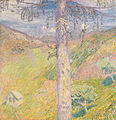A good novelist knows magic. Not only the magic of spinning tales we get lost in, but various sleight of hand techniques to heighten a reader’s experience.
Writing Tip for Today: How’s your novel magic? Here are some areas where magic is appreciated by readers:
- Making boring times go by quickly. To a reader, a boring passage (even if it’s vital to the story) is an invitation to stop reading. I always edit out lines such as, “For the next few days nothing happened.” Or, “Everything went smoothly.” Why give the impression that the rising action and tension have abated? Another related pitfall is when a writer acts out a scene with repetitive or drawn-out actions or dialogue. Say a small child is whining from the back seat. “Are we there yet” is funny the first time. Irritating the second time. Insufferable the third time. If you write it one more time, the reader may run screaming from the room. Novel Magic: give the illusion of this kind of occurrence without making the reader suffer through the whole thing. Give the pattern, then allow readers to fill in the rest.
- Describe only the details which make a difference. Writers get confused when first they’re told to write a lot of CSD (Concrete Sensory Detail). But when an exhaustive list of setting or character description ensues, eyes tend to glaze over. Novel Magic: Describe only a few details–ones that make a scene or a character distinctive. We all have hair, eye color, etc. But not everyone slouches when they walk, jingles pocket change or throws out spittle when they talk (eeww). Be picky about which details you give.
- No Micro-managing. Writers sometimes give too much information when they write action too. Saying the character moved 3.5 inches to the right only makes the reader stop to consider how long 3.5 inches really is. And is it the character’s right or the reader’s right? If a character picks up a 4.7 cm rock, the reader has to get out a mental ruler. Novel Magic: Compare objects when possible to easily recognized objects. Say the rock was as big as a tennis ball and readers know what you mean. Also, you’re safe to leave out right/left stage directions. Just say “he picked up a tennis ball-sized rock with one hand and scooted behind the door.” If the reader imagines the movement to the left instead of to the right, it won’t be a problem.




